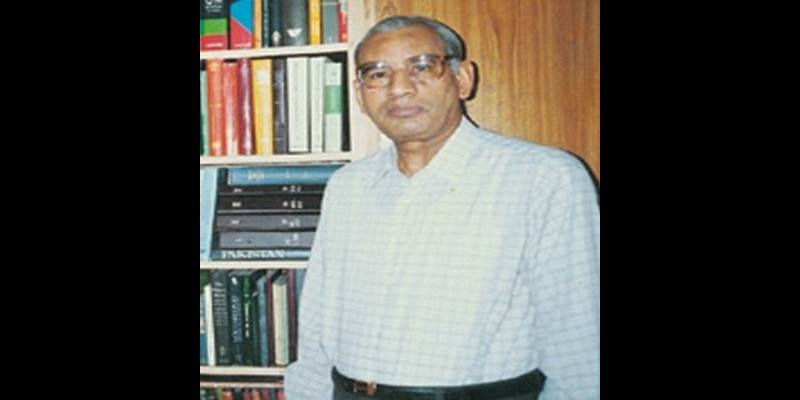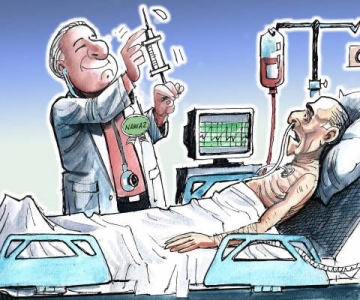A shorter version of this essay was published in Libas International (VOLUME 23 ISSUE 3 March, 2010)
We are an unfortunate country. The way we treat our scholars and intellectuals can only be termed shameless. Pakistan’s only indigenous historian who dared to return to his country and work in the trying conditions, died on the 15th of July 2009, neglected and forgotten, in his small suburban home in Lahore. A few news items flashed on the TV screens and the newspapers. Few bothered to write about him and very soon his passing away shall be another footnote in our contemporary existence.
KK Aziz was no ordinary scholar. Author of nearly 50 titles and a dedicated man of letters, the range of his research was astounding. He even traced his family history and wrote about it in the first volume of his autobiography. More importantly, his real contribution was a more sanguine interpretation of Pakistan’s creation, which remained objective within the confines of patriotism. His was an argument that was more balanced and nuanced than the shenanigans of Pakistan’s depraved official historians, who found the creation of Pakistan in Muhammad bin Qasim’s invasion of Sindh in 712 AD.
Even in his last days, he was working on many projects and to his satisfaction, his book on Lahore’s famous Coffee House appeared a few months before his demise. It is not that people were unaware of his existence or works, but it was a simple issue – nobody really cared, as nobody cares for history in a country reeking of opportunism, adhocism and complete domination of the right-wing mullahs over the national discourses. If anything, there is no discourse in Pakistan. There are monologues of dictators, spiels of maverick politicos, sermons of the Imams and fatwas of the murderers who use intimidation and violence in the name of our peaceful religion.
How could KK Aziz, after teaching at so many universities abroad and amid so many job offers, choose to be back in Lahore to spend the last decade of his existence? His first commitment was to his country. He had already experienced the trauma of Partition when he had to leave his beloved Batala in East Punjab. That wound remained fresh until his last. He recounted to me how his last two visits to India, especially Batala, were tormenting and intensely haunting. For hours, he cried in the midst of strangers who were the new residents of his childhood home. The old courtyard was there, so was a dried-up well and a dying tree; in fact he exactly remembered the plan of Batala town and the directions for getting there. Yet everything had changed.
Perhaps this is why he did not want to die abroad or spend his last years in foreign climes, as that would have been akin to the multiple deaths which Ghalib, the great poet, was always wary of. Once was enough, Ghalib said, if one had to die.
Khurshid Kamal Aziz was born near present day Faisalabad on the 11th of December, 1927. After his early education in Batala, Aziz joined Government College Lahore, where he had the chance to be tutoured by the most eminent men of his age, such as Professor Ahmed Shah Patras Bukhari and Professor Siraj-ud-din. This is where he discovered his penchant for history and historiography. His father wanted him to join the Civil Service, but when he presented him with his first book, his father realized that Aziz was on the right path. Over the next many years, he taught at various universities in Lahore, Cambridge, Toronto, Heidelberg and Khartoum.
Zulfiqar Ali Bhutto honored him by appointing him as the Chairman of the National Commission on Historical and Cultural Research and as a special advisor to the Prime Minister from 1973 onwards. Aziz had to leave the national institution in 1978, as General Zia-ul-Haq would not tolerate a grain of independent research and even a morsel of truth. The Zia years were the ultimate package of lies, hypocrisy and falsehoods imposed on a hapless people, whose popular leader had been brutally murdered through judicial means and whose regional voices had been silenced through brutal crackdowns. Aziz lived abroad during these dark years.
Years later, KK Aziz compiled his masterpiece “The Murder of History”, which became a classic during his lifetime. This was a scathing and forthright attack on the distortions introduced into our mainstream curricula. Aziz looked at dozens of Pakistani textbooks and exposed the sham which the Pakistani state had concocted in the name of history, where facts were fiction and biased opinions were branded as the truth. The slant of painting all Hindus as evil bannias and of fishing for false foundations for Pakistan’s creation was duly exposed by Aziz. This is a book that needs to be read by every Pakistani to realize the colossal crime committed by the state against its own citizenry. Little wonder that we have become rudderless and are still searching for an identity as we are so shy of facing the truth.
Throughout his working life, his lovely wife Zareena Aziz remained a companion at all levels. Zareena Aunty was not just a household manager, but also an avid reader, critic, editor and even a researcher. Zareena Aunty was a formidable part of his intellectual existence, much like the rock beneath, to use a phrase by Emile Bronte from her legendary novel Wuthering Heights. It is a separate matter that Zareena Aunty was alone in the last year of KK Aziz’s life. She was rushing him to hospitals and tending to him with little support from the world outside. It was only at the Fatima Memorial Hospital where the management and staff gave KK Aziz his due by tending to him with the utmost career. Earlier, Punjab’s Chief Minister tried to intervene but the facilities at Jinnah Hospital were sub-optimal at best. The Governor of the Punjab could only send a crate of mangoes to a man lying semiconscious on his deathbed.
The state, society and intelligentsia in Pakistan had forgotten about this towering scholar of our times. His books on Chaudhry Rehmat Ali, Sir Agha Khan III, the Pakistan Movement, the political system of Pakistan and other topics shall always be remembered and perhaps keep his legacy alive. After all, we cannot be pessimists. Pakistan will change one day. Perhaps.



